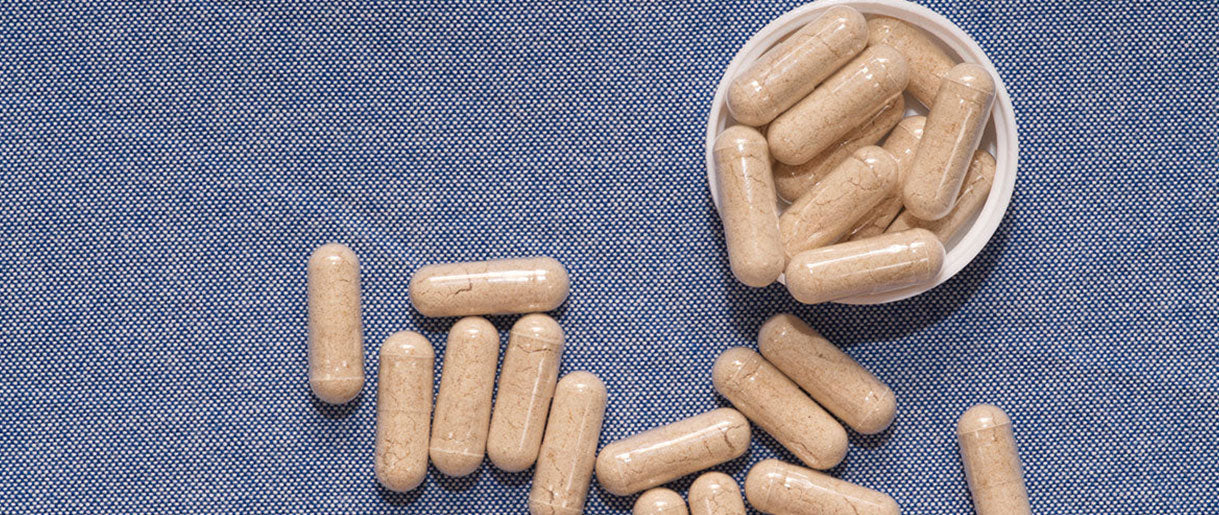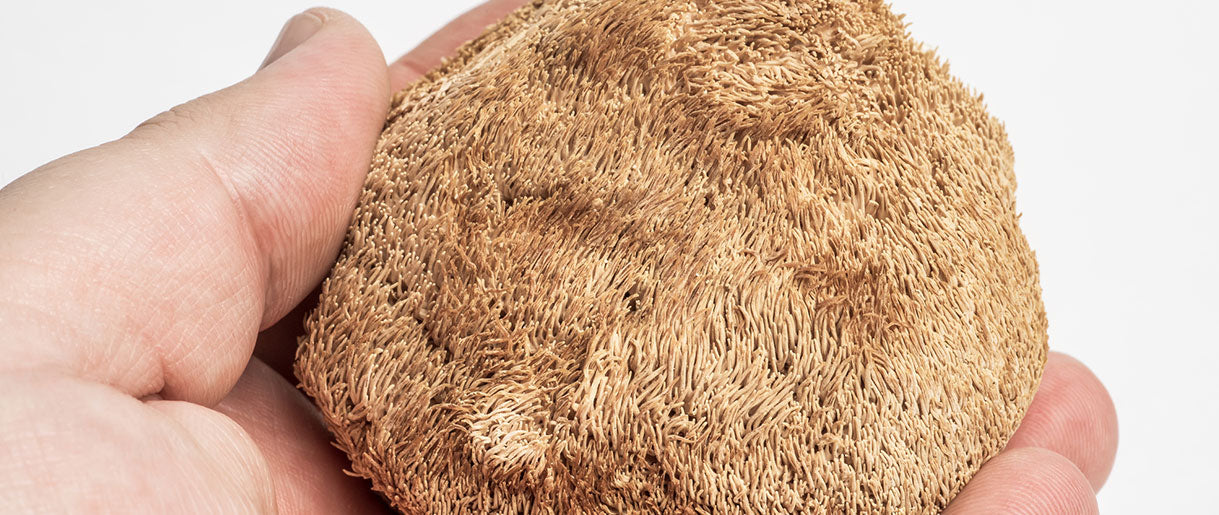Lion's Mane, a super mushroom that promises enhanced brain function and a boosted immune system, has captured the attention of wellness enthusiasts worldwide.
But with its growing popularity, how do you best harness the power of Lion's Mane? It starts with understanding its various forms and their unique benefits.
Culinary delights await with fresh Lion's Mane. Its meaty texture makes it perfect for dishes that need a seafood substitute. Sauté, bake, or stew it to unlock its delicate flavor.
Powdered or encapsulated, Lion's Mane is a boon for those on the go. These forms make it easy to incorporate into your daily routine, ensuring you never miss out on its cognitive-enhancing effects.
Tinctures offer concentrated power. A few drops can be the quick boost your brain needs, blending easily into any beverage for a seamless health upgrade.
But beware of low-quality imitations. Knowing how to spot and avoid these is crucial—prioritize products that emphasize purity, with minimal fillers and additives.
Knowing what to look for when buying Lion’s Mane can help you choose the right form and transform your approach to health and well-being.
This detailed guide will show you how to make Lion's Mane a pivotal part of your wellness regimen. Read on, and your body and mind will thank you!
How to Use Lion’s Mane in Cooking
Basic Preparation

Cleaning and preparing Lion's Mane for cooking is straightforward. First, gently brush off any dirt using a soft brush or paper towel; avoid rinsing it directly under water as it tends to absorb moisture.
If you must rinse, do it quickly and pat it dry immediately. Next, slice the mushroom into dices or strips, depending on your Lion’s mane mushroom recipe.
The unique, stringy texture of Lion's Mane makes it easy to tear apart by hand, which is often preferable to preserve its form.
Lion’s Mane Mushroom Recipes to Try
Lion's Mane mushroom is versatile in the kitchen, suitable for a range of dishes that cater to both simple and sophisticated tastes:
- Sautéed Lion's Mane: Begin by heating a skillet with a bit of olive oil or butter. Add minced garlic and the prepared Lion's Mane. Sauté until the mushroom pieces become golden brown and crispy on the edges. Season with salt and pepper to taste. This method highlights the mushroom's subtle seafood-like flavor, making it an excellent companion to pasta or as a topping for a gourmet toast.
- Lion’s Mane Crab Cakes: Combine finely chopped Lion’s Mane with breadcrumbs, mayonnaise, mustard, and spices. Form into patties and pan-fry until crisp. These "crab" cakes are a delightful vegetarian twist on a classic seafood dish.
- Creamy Lion’s Mane Soup: Simmer the mushroom with onions, garlic, vegetable broth, and herbs until soft. Blend until smooth and stir in a splash of cream for a rich, comforting soup.
- Lion’s Mane Tea: For a soothing beverage, simmer dried Lion’s Mane pieces in water for 15 minutes. Strain and enjoy the mushroom tea, which is said to offer cognitive and immune benefits.
By exploring these recipes, you can enjoy the health benefits of Lion's Mane in delicious and innovative ways, whether you’re cooking a hearty meal or seeking a quick health boost.
How to Use Supplemental Forms of Lion's Mane

Powders and Capsules
Lion's Mane powder and capsules provide a convenient way to incorporate this super mushroom into your daily routine, especially for those who are often on-the-go or prefer not to cook.
- Powders: Lion's Mane powder can be easily added to a variety of foods and beverages without altering the taste significantly. It blends well into smoothies, coffee, tea, or soups, providing a seamless way to boost your nutrient intake. This form is particularly appealing for its versatility and ease of use. Simply incorporate a scoop into your meal preparation for an effortless health enhancement.
- Capsules: For those who prefer a no-fuss, no-muss approach to supplements, capsules are ideal. They provide a measured dose of Lion's Mane without the need for preparation or taste adjustment. This form is excellent for maintaining consistency in dosage, particularly for cognitive (1) and immune support (2). Capsules can be taken with water, much like any other dietary supplement, making them a straightforward choice for daily use.
Tinctures and Extracts
Tinctures and extracts of Lion's Mane offer a concentrated form of the mushroom's active ingredients, making them potent options for those looking to maximize their intake of its beneficial properties.
- Tinctures: These are typically made by soaking Lion's Mane in alcohol to extract the active compounds. The resulting liquid is highly concentrated and is taken in small doses, usually a few drops at a time. Tinctures are known for their ability to deliver benefits quickly, as the alcohol base allows for rapid absorption into the bloodstream. They can be administered directly under the tongue or added to water or tea.
- Extracts: Similar to tinctures but often alcohol-free, extracts are made using water or other solvents to draw out the beneficial compounds. These are usually available in liquid form or as a spray. Extracts are particularly useful for those who avoid alcohol but still want a concentrated form of Lion's Mane. They can be used similarly to tinctures, with drops added to beverages or taken directly.
Both tinctures and extracts are valued for their potency and the speed with which they can deliver Lion's Mane’s cognitive and health benefits.
They are particularly suited to individuals looking for immediate effects or those who may have difficulty incorporating powders or capsules into their routine.
Choosing between these supplemental forms depends largely on personal preference and lifestyle needs, making Lion's Mane a flexible and beneficial addition to any wellness regimen.
This might interest you: Check Out and Try Our Organic Lion's Mane Powder - Get 10% Off!
Dosage Guidelines for Lion's Mane Mushroom

Determining the right dosage of Lion's Mane can vary depending on the form you choose and your specific health goals. Here are general guidelines to help you get started:
Fresh or Cooked Lion's Mane:
- For culinary uses, incorporating about 1-2 cups of fresh Lion's Mane into meals daily is considered beneficial for most people. This amount can be adjusted based on personal tolerance and dietary preferences.
Powders and Capsules:
- Powders: A common starting dose is 1-2 grams per day, mixed into beverages, smoothies, or meals. Adjust the dosage according to your response and health needs.
- Capsules: Typically, capsules contain a more concentrated dose, often ranging from 500 mg to 1000 mg. Taking one to two capsules daily is usual, but always refer to the package instructions for guidance.
Tinctures and Extracts:
- Due to their concentration, tinctures and extracts should be used sparingly. Starting with a small dosage, such as a few drops or a measured dropper taken 1-2 times daily, is recommended. Adjust based on the effects and consult with a healthcare provider if unsure.
General Advice:
- Start with a lower dose to assess your body’s reaction and gradually increase as needed.
- Consult a healthcare professional before beginning any new supplement regimen, especially if you have underlying health conditions or are taking other medications.
By following these guidelines, you can safely incorporate Lion's Mane into your health routine and optimize its cognitive and immune-enhancing benefits.
Purchasing and Storage Tips for Lion's Mane

Where to Find Lion’s Mane
Finding Lion’s Mane can vary depending on whether you're looking for fresh, dried, or supplemental forms of the mushroom:
- Fresh Lion’s Mane: This form is often available at farmers' markets, specialty grocery stores, or health food stores, especially those that stock a variety of mushrooms. Some Asian markets may also carry it, given its popularity in traditional Eastern medicine.
- Dried Lion’s Mane: You can purchase dried Lion's Mane online through various health food retailers, specialty mushroom suppliers, or larger e-commerce platforms. Dried mushrooms offer a longer shelf life and can be rehydrated for use in cooking.
- Supplements (Powders, Capsules, Tinctures, Extracts): These are widely available in health food stores, pharmacies, and online. When buying supplements, it’s important to choose reputable brands that provide transparency about ingredient sourcing and extraction methods.
How to Store Lion’s Mane
Proper storage is crucial to maintain the freshness and potency of Lion's Mane, regardless of its form:
- Fresh Lion’s Mane:Keep fresh mushrooms in the refrigerator in a paper bag. Avoid plastic bags as they trap moisture, which can cause the mushrooms to become slimy and spoil faster. Fresh Lion's Mane should be used within a week for best quality.
- Dried Lion’s Mane: Store dried mushrooms in a cool, dark place in an airtight container. They can last for up to a year if stored properly. Avoid exposure to moisture and direct sunlight to maintain their quality.
- Supplements (Powders, Capsules, Tinctures, Extracts): Keep these in a cool, dry place away from direct sunlight and moisture. Most supplements come in containers designed to protect them from light and air, but ensure the lids are tightly closed after each use. Follow the expiration date on the package to ensure effectiveness.
By following these purchasing and storage tips, you can ensure that your Lion’s Mane mushrooms and supplements retain their beneficial properties for as long as possible.
Whether you're exploring its culinary uses or integrating supplements into your wellness routine, proper handling is key to getting the most out of this incredible mushroom.
Precautions and Considerations for Using Lion's Mane

Possible Side Effects
Lion's Mane is generally considered safe for most people, but like any supplement, it can have side effects in certain individuals.
Commonly reported side effects are mild and may include digestive discomfort such as bloating or gas, especially when consumed in large amounts. Some people might also experience skin irritations when handling the fresh mushroom.
Additionally, because Lion's Mane can impact cognitive function and nerve growth (3), there is theoretical concern about its interaction with medications related to neurological or psychiatric conditions.
It is advisable to consult a healthcare provider if you are taking medications for issues like anxiety, depression, or other neurological conditions, to avoid potential interactions.
Who Should Avoid Lion’s Mane Mushrooms?
While Lion's Mane is beneficial for many, certain groups should exercise caution or avoid it altogether:
- Individuals with Mushroom Allergies: Anyone with a known allergy to mushrooms should avoid Lion's Mane, as it could trigger allergic reactions ranging from mild to severe.
- Pregnant and Breastfeeding Women:There is limited research on the effects of Lion's Mane in pregnant or breastfeeding women. As a precaution, it is recommended to avoid use during these periods unless otherwise advised by a healthcare provider.
- Those with Bleeding Disorders: Lion's Mane may potentially increase the risk of bleeding due to its antiplatelet or anticoagulant effects (4). Individuals with bleeding disorders or those on blood-thinning medications should consult their doctor before starting any Lion's Mane supplements.
- Individuals Scheduled for Surgery: Due to its potential blood-thinning effects, it's recommended to discontinue the use of Lion's Mane at least two weeks before any planned surgery to prevent excessive bleeding.
As with starting any new dietary supplement, it’s essential to discuss it with a healthcare provider to ensure it is safe based on your personal health history and current medications. This conversation is crucial to safely enjoy the benefits of Lion's Mane without adverse effects.
FAQs About How To Use Lion's Mane Mushroom
How Long Does It Take To Notice The Benefits Of Lion's Mane?
The effects of Lion's Mane vary based on individual factors like dosage, frequency of use, and overall health.
While some might begin to notice improvements in cognitive functions or mood within just a few weeks, more substantial benefits such as nerve regeneration or enhanced immune response may emerge over several months.
Consistent daily consumption is key to achieving the full benefits this mushroom offers.
Can Lion's Mane Be Combined With Other Medicinal Mushrooms?
Yes, Lion's Mane can be effectively paired with other medicinal mushrooms for enhanced synergistic effects. Each type of mushroom brings its unique set of benefits, creating a comprehensive health support system when combined:
- Reishi: Aids in stress reduction and immune support.
- Cordyceps: Boosts energy and athletic performance.
- Chaga: Provides a rich source of antioxidants for immune and overall health.
- Turkey Tail: Supports immune function and gut health.
Begin with smaller doses when combining mushrooms and adjust as necessary to suit your health needs.
What Is The Best Time Of Day To Consume Lion's Mane?
The ideal time to take Lion's Mane depends on your personal health objectives:
- For Cognitive Enhancement: Morning or early afternoon consumption is recommended to maximize focus and productivity throughout the day.
- For Stress and Anxiety Relief: Evening doses may help in promoting relaxation and improving the quality of sleep.
Experiment with timing to see what works best for your routine and wellness goals.
Does Lion's Mane Make You High?
No, Lion's Mane does not produce any psychoactive effects. This mushroom is valued for its potential to enhance cognitive abilities and support neurological health, not for altering perception or consciousness.
Unlike psychedelic mushrooms, Lion's Mane focuses on brain health without causing hallucinations or a 'high' feeling, making it a safe choice for daily use in your wellness regimen.
Key Takeaways
Lion's Mane mushroom is a fascinating natural supplement that offers a host of benefits, from enhancing cognitive function and supporting neurological health to boosting the immune system and potentially alleviating symptoms of anxiety and depression.
Throughout this guide, we've explored how to select, prepare, and use Lion's Mane in various forms—whether fresh, dried, or as a supplement like powders, capsules, or tinctures. We've also covered the best practices for storing these forms to maintain their potency and efficacy.
Given its versatile uses in cooking and its availability in supplemental forms, Lion's Mane can be easily incorporated into your daily diet and wellness routines.
Whether you're adding it to your favorite dishes, brewing it into a soothing tea, or taking it as a supplement, this super mushroom could be just what you need to enhance your overall health and well-being.
We'd love to hear about your experiences with Lion's Mane! Have you tried any recipes that you found particularly delicious? Or perhaps you've noticed health benefits since incorporating it into your routine?
Share your stories and favorite Lion's Mane recipes in the comments below. Your insights could inspire others to explore the wonderful benefits of this unique mushroom.
References
- The Acute and Chronic Effects of Lion's Mane Mushroom Supplementation on Cognitive Function, Stress and Mood in Young Adults: A Double-Blind, Parallel Groups, Pilot Study, (2), https://pubmed.ncbi.nlm.nih.gov/38004235/
- Immunomodulatory effects of Hericium erinaceus derived polysaccharides are mediated by intestinal immunology, (2), https://pubmed.ncbi.nlm.nih.gov/28266682/
- Neurohealth Properties of Hericium erinaceus Mycelia Enriched with Erinacines, (3), https://www.ncbi.nlm.nih.gov/pmc/articles/PMC5987239/
- The Effect of Mushroom Extracts on Human Platelet and Blood Coagulation: In vitro Screening of Eight Edible Species, (4), https://www.ncbi.nlm.nih.gov/pmc/articles/PMC6950045/










Let Us Know Your Comments